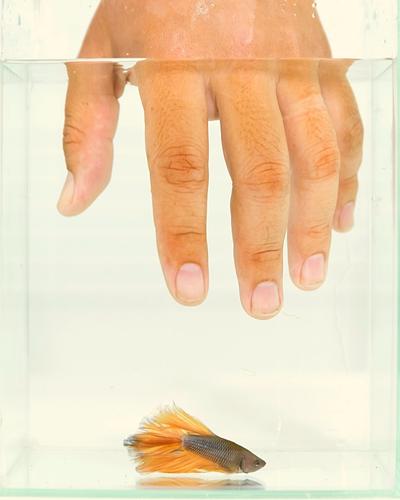Do betta fish play dead? If you’ve ever owned a betta, then you know that they can be pretty mischievous and mysterious. From blowing bubble nests to occasionally playing dead
Betta fish are a popular pet, but many fish owners don’t understand why they play dead.
Bettas can play dead for several reasons, but the most common is to avoid being eaten by a predator.
Why do beta fish play dead? When a betta feels threatened, it will often roll over on its side and flop around as if dead.
This behavior often scares away the predator, giving the betta a chance to escape.

There are countless behaviors these lovely creatures are capable of— all of which can leave us scratching our heads trying to figure out why!
In this blog post, we’ll explore the five most common reasons why your Betta may appear to play dead, so you can better understand their curious behavior.
Table of Contents
ToggleDo Betta Fish Play Dead or Sleeping?
Do bettas play dead? Betta fish playing dead is rare— it’s more likely that your fish will sleep.
Betta fish sleep just like any other pet, and when they do, they tend to float at the surface of their water with their eyes closed and fins relaxed.
However, if your betta is startled while sleeping, it may flop around in a way that looks like fish sleeping or playing dead.
Are Betta Fish Trying to Trick Predators?
The most common reason your betta may play dead is to make predators think they’re already dead so the predator will lose interest in them.
This behavior is also quite common in other animals; cats, for example, sometimes lay still and pretend to be dead to ward off an intruder.
It’s believed that bettas have picked up on this behavior and are using it to protect themselves.
Do Betta Fish Play Dead When Stressed?
Bettas can become stressed for a variety of reasons. When they’re feeling overwhelmed, they may posture themselves in a way that looks like they are playing dead.
This behavior is usually seen when their environment has changed drastically or if they’ve been exposed to too much noise or light.
Is It Normal for Fish to Play Dead?
Yes. Playing dead is normal behavior for some fish species, especially those that live in the wild and need to protect themselves from predators.
It appears that certain types of fish have mastered the art of deception! Central American cichlids employ a remarkable stratagem by playing dead to lure scavengers as food.
Bettas are one such species; however, this behavior should be monitored closely as it may indicate that your betta is stressed or ill.
However, in some cases, this behavior could be indicative of ill health or other issues.
5 Reasons Why Do Betta Fish Play Dead
Have you ever noticed your Betta lying motionless at the bottom of your own tank? Don’t worry; it’s not betta fish dead! Betta fish playing dead is an expected behavior among these colorful creatures.
While this behavior may appear concerning to some, it is a spontaneous act for these fish, and there are five surprising reasons why they may do it. Let’s take a look.
Low Oxygen Levels in the Tank
Bettas need oxygen to survive. If there is insufficient oxygen in their tank, they will often lay on the bottom to conserve energy until oxygen levels return to normal. To provide your betta with adequate oxygen, ensure that your tank has plenty of live plants and keeps up with regular water changes.
Sickness or Injury
If your Betta is sick or injured, he may lay on the bottom of his tank to protect himself from predators. If you suspect your betta may be sick or injured, ensure he is checked out by an experienced veterinarian or pet fish store immediately to receive proper treatment.
Stressful Situations
Sometimes Bettas play dead when they feel like they are in a stressful situation, such as being chased by another tank mate or observing too many unfamiliar objects in their environment (like humans). It’s essential to give your Betta lots of hiding spots in his tank so that he will feel safe and secure when you’re around.
Temperature Fluctuations
Bettas can become stressed by sudden temperature fluctuations in their environment, and playing dead can be one way for them to cope with this stressor. To prevent temperature fluctuations from causing distress for your betta, invest in an aquarium thermometer and keep their tank at a steady temperature between 78-82°F (26-28°C).
Breeding Instincts
The last reason Bettas play dead is that they are trying to breed! When two Bettas come into contact with each other, the male betta will often display this behavior as part of his courtship rituals towards the female – although this behavior should never be confused with aggression since it is completely harmless!
While it may seem strange at first glance, playing dead is a perfectly natural behavior for Betta and should not cause any alarm if observed regularly in its tank environment.
With that said, it’s essential to remain vigilant about keeping up with water changes and monitoring water quality parameters such as temperature and pH levels – these factors all impact whether or not your Betta feels safe enough to swim around freely!
And lastly, if you witness any irregular behaviors from your betta, such as excessive swimming around or constant hiding, don’t hesitate to consult an experienced aquarist for advice – better safe than sorry!
Do Fish Play Dead When Scared?
Yes, many fish species (including Bettas) can play dead when scared to protect themselves from potential predators.
This behavior is most commonly seen in wild fish trying to evade predation by playing dead and allowing their predator to move on.
In captivity, this behavior is usually triggered by sudden changes in the environment or the presence of unfamiliar objects like humans.
To help your Betta combat stress and feel safe in its environment, provide plenty of hiding spots and keep up with regular water changes.
Additionally, you should constantly monitor your tank’s temperature and pH levels to remain consistent for optimal Betta health!
Do Bettas Move When Dead?
No, Bettas do not move when they are dead. Dead betta will typically sink to the bottom of the tank and remain motionless until removed from the water.
If you notice that your Betta is lying at the bottom of the tank for an extended period, it may be a sign that something is wrong, and it should be taken out of the water to inspect further.
If your Betta is playing dead, you may still see occasional twitching and tail movement as they remain in this state.
However, it’s important to remember that Bettas can play dead for extended periods, so don’t panic if you observe your betta in this state for more than a few minutes.
If you are worried about your fish’s health, it is always best to consult an experienced veterinarian or aquarist as soon as possible.
Betta Fish Behavior Before Death
Before a betta fish die, you may observe several behaviors that can indicate the cause of its demise.
These can include difficulty breathing (often indicated by them gulping for air at the top of the tank), lethargy, loss of appetite, and color fading.
Additionally, if you notice sudden changes in their behavior, such as swimming erratically, it could be a sign that something is wrong and should be checked out immediately.
The most important thing to remember about Betta fish health is prevention.

By providing your betta with a clean and healthy environment, regularly monitoring water parameters, and keeping up with prime water conditioner tank maintenance, you can help ensure that your Betta stays happy and healthy for many years to come!
Suppose your beloved betta is exhibiting signs of swim bladder disease, such as an inability to maintain normal body positioning or consistently swimming upside down. In that case, it may be necessary to transfer them into a hospital tank for treatment.
Further symptoms include tummy inflation and lack of appetite, lethargy, and a curved spine while in motion–all pointing towards this potentially dangerous condition.
Signs of a Stressed Betta Fish
Signs Your Betta Is Stressed Out: When a Betta is stressed, it may exhibit several behaviors, such as hiding, avoiding contact with other tank mates and humans, swimming erratically, and rapid gill movements.
You may also notice a decrease in appetite and changes in coloration. If you see any of these signs, it’s crucial to take action and adjust your Betta’s environment to be more comfortable.
Some factors that can cause stress in Betta include improper water temperature and pH levels, overcrowding of the fish tank, and lack of hiding spots.
Ensuring these factors are taken care of, you can help your Betta feel more relaxed and at ease in their surroundings.
How Can I Keep My Betta Fish Entertained?
How do you excite a betta fish? It’s no secret that Bettas are intelligent and very active fish that need plenty of stimulation to stay healthy and happy. A bored Betta can become lethargic, inactive, and even sick.
By following these top 10 tips for keeping your Betta entertained, you can ensure that your aquarium fish stays healthy and happy.
What Toy Should I Get My Betta When He’s Bored?
What Toys Do Betta Fish Like to Play With? Betta fish are curious and playful, so they enjoy exploring and playing with toys. Some great options for stimulating your Betta include floating logs, motorized toys, or light-up balls.
You can also provide different aquatic plants that your Betta can explore for hours on end! Additionally, you can create a maze of small tunnels or caves for your betta to explore.
No matter what toy you choose, ensure that it is safe and non-toxic so your Betta can have hours of fun without harm!
Some Toys That Betta Fish Like to Play With
1. Betta Balls – These tiny plastic balls float at the top of your fish tank, allowing your Betta to explore and play with them.
2. Floating Logs – These provide excellent hiding spots for your betta while they take breaks from swimming around the aquarium or exploring other toys.
3. Motorized Toys – Motorized toys are great for providing your Betta with hours of fun. Most offer interactive features that can help keep your betta entertained and stimulated.
4. Light-up Balls – These balls light up in the water and provide visual stimulation that helps to keep your Betta engaged and active.
5. Aquatic Plants – Aquatic plants offer a natural and safe environment for your Betta to explore. They also provide hiding spots that can help lower stress levels.
6. Tunnels & Caves – Creating tunnels and caves in your fish tank can provide an enjoyable maze-like environment for your fish and plenty of fun exploration opportunities!
7. Activity Centers – Activity centers are interactive toys that offer your Betta opportunities to play and explore.
Top Recommended Betta Fish Toys (Best Toys for Betta Fish)
Betta fish are intelligent creatures that need stimulation and exercise to stay healthy and happy.
By providing them with toys, hiding spots, and a clean environment that is kept within the proper parameters, you can ensure that your Betta will remain healthy and entertained for many years. Check the best toys for betta fish below.
Do Betta Fish Need a Plant?
Betta fish thrive in their natural habitat and home when provided with various plants. Adding foliage to the fish tank can give your finned friends appropriate hiding spots and relaxing resting places.
Betta may look fierce with their “fighter” name and beautiful fins. However, these aquatic creatures are typically shy when exploring their environment in a community or divided tank setting.
Plants can be used as protective barriers to help reduce stress levels – allowing betta fish the safe space they need!
Why Does My Betta Fish Pretend to Be Dead?
Betta fish have a habit of “playing dead” when feeling stressed, scared, or insecure. This behavior is known as Thanatosis, and it typically occurs when the fish feels threatened by an unfamiliar object or situation.
When a Betta plays dead, it will float motionlessly at the tank’s surface. This behavior is the fish’s way of making itself look less appealing to potential predators.
If your Betta fish seems to be playing dead, it may indicate that something in the tank is causing it anxiety.
Try removing any unwelcome objects or rearranging decorations to provide a more secure and comfortable environment for your fish.
How Can You Tell If a Betta Fish Is Dying?
How do you know when your betta is dying? A betta fish may be in danger if its vibrant colors fade and it begins to show signs of unresponsiveness, agitation, or fatigue.
Additionally, a lack of appetite and gasping for air could indicate an unfortunate decline in health. If you notice these symptoms in your Betta, it is important to take action immediately.
Testing the water for pH levels and ensuring that your tank has the correct temperature can help ensure that your betta fish stays healthy. Additionally, providing a varied diet with plenty of fresh food, frozen food, and toys can keep them active and engaged!
How to Keep My Betta Fish from Dying?
Losing a pet is heartbreaking, especially one we’ve taken care of and loved.
If you’re like most fish owners, you only have a little experience with fish diseases or how to treat them. So when your Betta fish gets sick, it can be terrifying.
This video will show you how to save your sick fish from dying using our simple step-by-step guide. You’ll learn about the most common fish diseases and how to treat them quickly and efficiently so your beloved Betta can return to swimming happily in his tank again.
Commonly Asked Questions about Before and After Stressed Betta Fish Signs (FAQ)
Why Does My Betta Fish Look Dead?
Why does my betta fish play dead? There are many possible reasons why your Betta fish may appear dead. The most common cause is a lack of oxygen in the community tank due to overstocking or poor water quality. Also, high ammonia, nitrite, and nitrate levels can cause a Betta to appear lifeless due to suffocation.
How Long Do Betta Fish Live?
Healthy fish can live for up to 5 years with the right care. This includes regular water changes, proper temperature levels, and a nutrient-rich diet.
Why Is My Betta Fish Not Moving but Still Breathing?
Betta fish looks dead but is breathing, why is my betta fish playing dead? This could signify stress, as Bettas require a calm and secure environment to remain healthy. If your betta is not moving but still breathing, it may be trying to hide from perceived threats or just taking a break from swimming.
Do Goldfish Play Dead?
Yes, goldfish may play dead if they are feeling stressed or threatened. This behavior is known as Thanatosis and can be caused by poor water conditions, overcrowding in the tank, or other tank mates it perceives as a threat.
Can Betta Fish Play Dead?
A healthy betta fish play dead or pretend to be asleep as a defense mechanism if they are stressed. It is crucial to provide your Betta with plenty of hiding spots and comfortable decorations to create a safe space for them to feel secure.
How Do U Know When a Betta Fish Is Dying?
Betta fish behavior before death can include a loss of appetite, discoloration of the flowing fins and body, gasping for air, lethargy, and rapid swimming movements. If a Betta fish is dying, it will show signs of fatigue and unresponsiveness.
How to Bury a Betta Fish?
Bury your Betta in an appropriate container, such as a small biodegradable box. Fill the box with soil and add some gravel to keep the soil moist. Place your Betta into the container and cover it with soil. Make sure to mark the burial site, so you know where to find it in the future.
Do Betta Fish Float When Dead?
Yes, Betta fish can float when dead. It is likely finished if your Betta is floating at the top of the tank and not swimming or responding to stimuli. Additionally, if the Betta fish floating upside down or on its side, it is a sign that the betta fish has died.
Do Betta Fish Rest on Plants?
Yes, Bettas may rest on plants in their tank. This is a natural behavior for Betta fish and can help them feel secure when feeling threatened or stressed.
Do Betta Fish Feel Pain When They Die?
Unfortunately, yes. Betta fish feel pain when they die due to a decrease in oxygen and the increase of toxins that result from death or disease. When betta fish death occurs, It is essential to provide a safe and comfortable environment for your Betta fish to prevent it from feeling unnecessary pain.
Does Siamese fight fish Play Dead?
Yes, Siamese fighting fish may play dead fish to evade predators or perceived threats. This behavior is known as Thanatosis and can be triggered by stress, poor water conditions, or overcrowding in the tank.
Do Betta Fish Play Dead as a Sign of Illness?
Do bettas play dead? Unfortunately, betta fish playing dead can also be a sign of illness. If your betta is displaying this behavior and other signs of disease— such as lack of appetite, lethargy, or erratic swimming— then it’s time to take them to the vet.
How to tell if betta fish acting dead?
Look for signs of life! If your betta isn’t moving, check for gill movement or faint flicks. A truly dead fish will be stiff and pale.
Why do fish play dead?
Why does my fish play dead? Fish don’t truly play dead. Some species, like cichlids, might lie still to lure scavengers close for a surprise attack! For others, it could signal stress or illness. Observe for other signs to diagnose the cause.
Conclusion
So, why do betta fish play dead? If you have a betta fish that frequently plays dead, there could be several underlying causes. First, check to see if the water in their tank is clean and at the correct temperature. They may be sick or stressed if everything seems fine with their environment. Betta playing dead fish could also signify that your betta is bored, so try adding some new toys or plants to their tank. Whatever the reason, keep an eye on your betta and consult a veterinarian if necessary. Do you have a betta that likes to play dead? Let us know in the comments below!
You might also like
- Can a Betta Fish Eat Goldfish Food! (Or Will It Be Harmful?)
- Why Does My Betta Fish Stare at Me? (5 Reasons & Solutions)
- How to Tell If Betta Is Stressed? (10 Signs of Happy Betta)
- Why Is My Betta Fish Turning White? (Symptoms & Curing Tips)
- Betta Not Eating and Staying at Bottom of Tank: 3 Reasons Solved




